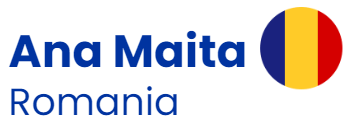Change Maker
Mothers for Mothers is a small NGO started in 2010. Since then, it has become the most vocal advocacy group in Romania championing accessible, quality, health care and social protection for women and children.
When I started it, there were just four or five of us. Our goal was to push the Romanian government to adopt updated childbirth and vaccination recommendations coming from the World Health Organization.
We had all seen the government’s failure at introducing an HPV vaccination campaign in 2008. The government bought more than 330,000 doses of the vaccine. The plan was to immunise 110,000 girls between the ages of 9 and 11, but only 2,600 girls accepted the vaccine and the remaining doses had to be destroyed.
So, what happened? Communication with parents and physicians was a disaster. No one explained the many lifesaving benefits of the vaccine and how few risks it carried. Soon, the Church began turning against the Ministry of Health, and the anti-vax movement was in full control. Even some of my own colleagues, I discovered, were spearheading those anti-vax messages. So, I was thrown into this battle, and for me it was personal. My father-in-law is a polio survivor. I could see the dire effects from an era when parents needed vaccines but didn't have access to them, and how it affected their children and their own lives for the rest of their existence.
I couldn't understand why any parent would refuse the benefits of vaccination for their children. Once Mothers for Mothers joined the fight, I got a call from a young woman who had six months to live. She was dying from cervical cancer caused by the human papillomavirus. Her daughter was 2 years old, and the mother said, “I'm terrified that my daughter is so young, she won’t remember me”. This hit me hard. I began researching HPV related cancers and realised that we in Romania should be preventing all these cases.
Instead, the state’s poor planning and stop-and-start vaccine purchases left many girls waiting months or even years for a second or third dose, and discouraged some doctors from ever starting the vaccinations; the state’s refusal to aggressively counter the anti-vax movement, allowed misinformation to spread and frightened many parents from even considering the vaccine for their daughters; and, of course, the state’s lack of urgency meant that people were dying and nothing was getting done.
We took it upon ourselves, with our limited resources, to launch a national public awareness campaign. We provided parents with the facts about the safety and effectiveness of the HPV vaccine. We did it with events. We did it through social media. We went on television to spread the word. But most importantly, we began to act as a watchdog. When we hear of doctors telling parents the vaccine is unavailable today, we go to the Ministry of Health and call in the press to raise the stakes politically.
We have put HPV vaccination back on the public and pollical agendas. And it’s beginning to work. Perhaps our biggest success was in 2018, when the Ministry of Health decided to buy large quantities of the vaccine again.
We also successfully lobbied the Romanian government to expand the age limit for free HPV vaccines from 11 up to 18 years of age, instead of only up to 14 years of age. An important improvement. And we got the government in 2021 to promise that boys would be offered the vaccine. We now need to intensify pressure on the Ministry of Health to ensure that becomes a reality.
Anti-Vaxxers are still very active in Romania, unfortunately. But a few years ago, we organised a workshop with the leaders of the National College of Physicians, the governing body for doctors. We told them, “Look, we can handle the vaccine naysayers in the public, but you have to handle the misinformation coming from your own doctors”; and slowly they started to do just that. And it’s helping.
A recent survey found that 75% of Romanian parents say they are aware that HPV infection can cause several forms of cancer in men and women. However, only 23% of Romanian parents said they had already immunized their daughters against HPV infection and only 32% stated that they planned to.
There is clearly much more work to be done here.
To find out more about our HPV and Hep B Action Network and its story, click here.
Don't hesitate to check out our HPV Testimonies project here.


